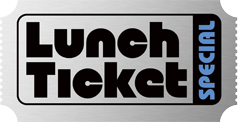I got my first job as assistant managing editor of a business magazine by telling the hiring manager that if she hired anyone else for the position, I would find that person and kill them, and she’d just have to hire someone else, so she may as well save herself some time and hire me. I still can’t believe that worked, but I was that determined to become an editor.
Flash forward to December 2011. It’s my first MFA residency at Antioch University in Los Angeles, where I found out two important things: 1) I was going to have to come up with a field study involving supervisory oversight and paperwork, and 2) I could fulfill that requirement by working as a genre editor at Lunch Ticket, which was inaugurated that month. I was able to combine my love of efficiency (okay, laziness) with my love of being an editor, and the rest is history.
When people think about being the editor in chief…they think about the perks of the job—having ultimate editorial say, access to faculty and resources, pull with editors of other literary journals—but they don’t consider the largest part of the job: the enormous responsibility.When people think about being the editor in chief (I hate using capital letters with that title), they think about the perks of the job— having ultimate editorial say, access to faculty and resources, pull with editors of other literary journals—but they don’t consider the largest part of the job: the enormous responsibility. The most important thing I learned as the head of a large, diverse staff was that it couldn’t be about me. Every single piece we chose for Lunch Ticket had been read and approved by a whole group of other people before it reached me. There were plenty of times that I looked at a given piece and thought, “No way,” but because others on the staff felt strongly in favor, we accepted it. Most authors are intimidated by how hard it is to get published. I’ve read many articles by editors in which they talk about their high standards and how much they enjoy saying “no.” I guess they think it makes them sound discerning. But it occurred to me that every genre editor on the Lunch Ticket staff represented an entire group of people who loved things that weren’t quite to my taste. I realized that it was so much more affirming to say “yes.” Yes to new genres and features that would allow us to accept more work, yes to first-time authors, yes to experimental storytelling, yes to stories thick with regional speech and colloquialism, yes to things I didn’t necessarily like but which displayed writing that was undeniably outstanding.
The flip side of the power of yes is the responsibility of no. For every writer who holds her writing at a remove and treats submission like a business, there are dozens who invest their whole souls into each submission, and who see rejection as a judgment on them as people. I was grateful to our managing editor at Lunch Ticket for crafting the kindest, gentlest, most respectful rejection letter. Our rejection letter was so nice that writers whose work we turned down routinely thanked us, and many were moved to submit again and again.
The literary journal world is tiny, and many authors are editors at other presses, so treating every submitter with respect and deference isn’t just good etiquette, it’s good business.Lastly, between the yes and the no is the person who wrote the piece. At conferences and readings all over the country, I’ve met and become friends with authors we published at Lunch Ticket. The literary journal world is tiny, and many authors are editors at other presses, so treating every submitter with respect and deference isn’t just good etiquette, it’s good business. Beyond that, I went to Antioch to meet people who were as serious about writing and editing as I was, and Lunch Ticket helped me form a community that extended far beyond my cohort in my own MFA program.
I’m not going to lie: stepping away from Lunch Ticket after I graduated was hard. I felt personally responsible for this journal that I had taken over after its first issue and had nurtured and shaped for two years. Once I handed over the reins, I had to turn away completely from Lunch Ticket or I would have driven the incoming EIC crazy with suggestions, observations, and not-so subtle insinuations that any departure from my way of doing things would end in disaster. Instead, I formed my own small press, whose success I largely credit to the skills I learned and to the connections I made as Lunch Ticket’s editor in chief. I’m proud of how Lunch Ticket has grown and evolved since I left at the end of 2013, and look forward to seeing the direction it takes under each new editor in chief.

